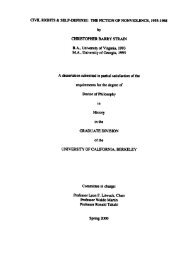Negro Digest - Freedom Archives
Negro Digest - Freedom Archives
Negro Digest - Freedom Archives
You also want an ePaper? Increase the reach of your titles
YUMPU automatically turns print PDFs into web optimized ePapers that Google loves.
Initial organizing efforts proved<br />
quite successful . Neighborhood<br />
councils were formed . The community<br />
action agency granted representation<br />
to these groups . For a<br />
while it seemed as if the "democratic<br />
process" might actually work<br />
for Black people .<br />
But the optimism was shortlived,<br />
for Black people ran into a<br />
brick wall when they pressed for<br />
more substantial changes, such as<br />
housing repairs, street paving, and<br />
public housing reforms .<br />
When Black people met continuous<br />
opposition in their efforts<br />
to being about change, the tone of<br />
the movement became more and<br />
more militant . The next two years<br />
saw important changes in the thinking<br />
of the community people . The<br />
neighborhood groups pressed for<br />
autonomy from the O.E.O . poverty<br />
agency . Tactics for change accelerated<br />
rapidly : petitions changed to<br />
pickets ; picketing evolved into mass<br />
marches ; mass meetings gave way<br />
to protests characterized by violent<br />
confrontations-all this in two<br />
years .<br />
The militancy of the community<br />
drew the attention of Black students<br />
at Duke University and North<br />
Carolina Central University . In addition,<br />
links between the community<br />
and students were formed during<br />
a Summer Intern Program in<br />
1968, in which Black college students<br />
from throughout North Carolina<br />
lived and organized in the<br />
neighborhoods . This involvement<br />
created a new atmosphere of co-<br />
40<br />
operation between Black college<br />
students and neighborhood people .<br />
During this time, Black students<br />
at Duke University underwent<br />
some important ideological changes .<br />
They began to work more in the<br />
community and with the Black nonacademic<br />
employees on campus .<br />
The students began to think and<br />
talk in terms of the critical question<br />
of the relevance of the entire<br />
educational process to the needs of<br />
the Black community . They concluded<br />
that the process as it exists<br />
is, in fact, irrelevant . Events on<br />
campus at this time began to move<br />
in rapid succession . There were a<br />
series of protests and confrontations<br />
which culminated in the students<br />
seizing the administration<br />
building and demanding that a<br />
Black Studies Program be established<br />
and controlled by Black people<br />
. Throughout these confrontations<br />
and protests, the students<br />
found that they had the strong, immediate<br />
and active support of the<br />
organized neighborhood groups. It<br />
was all of these ingredients, and of<br />
course, the subsequent refusal of<br />
Duke University to speak to the<br />
question of relevant Black education,<br />
which led the students and<br />
the community people to take a<br />
second look at their efforts. A simple<br />
truth was realized throughout<br />
the movement : that those who are<br />
oppressed cannot look to those who<br />
oppress them to deal in any way<br />
with the nature or source of the oppression<br />
. If Black people in Durham,<br />
North Carolina, wanted a rel-<br />
March 1970 NEGRO DIGEST
















